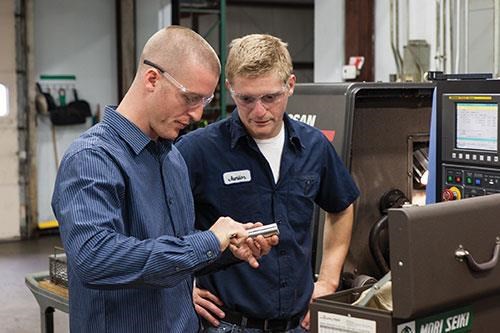Talent Shortage: Advice from a Human Resources Expert
The shortage of potential employees in manufacturing is a serious challenge that merits a serious response. An employment consultant describes how manufacturing businesses should think differently about talent and recruiting.
Share









.png;maxWidth=45)
DMG MORI - Cincinnati
Featured Content
View More

Hwacheon Machinery America, Inc.
Featured Content
View More
Luke Niels (left) is plant manager at Progressive Turnings, an example of a shop in which learning and knowledge sharing are valued. Learn more about this shop.
Ben Dollar, a principal with Deloitte Consulting’s Human Capital practice, recently wrote an article for the firm’s human resources blog about the various factors contributing to the shortage of talented employee prospects in manufacturing. He also described how manufacturing employers should respond to the serious challenge this shortage presents. Here is a summary of his advice to manufacturers:
1. Manage the talent pipeline like a supply chain, he says. Too many companies react to personnel needs by scrambling to fill holes as they appear. Take a predictive approach to identify coming workforce needs and take action to fill them far in advance.
2. Foster long-term career development and employee growth. Create a culture in which learning, improvement and knowledge sharing are highly valued.
3. Employers should challenge themselves, he says, to recruit employees from sources other than those from which employees have routinely come in the past. Seek a fresh perspective on the skills needed and the type of candidate who will ultimately be successful.
4. Think about recruiting and employment from a marketing perspective. Pay attention to the company’s “employment brand” as closely as the commercial brand. In fact, this might be the key role social media plays for manufacturing. While social media’s effectiveness is questionable at directly connecting buyers and sellers of manufacturing services, social media provides transparency into a company’s culture, significantly affecting the perception of the company’s employment brand.
5. Look closely at who does the shop’s recruitment and how this person carries out the work. Obviously, it all starts here. Manufacturers should “redesign and reskill the human resources function to address what is becoming one of the most significant challenges manufacturing companies have faced in decades,” Mr. Dollar says.
For related advice from another HR expert, read about my conversation with the hiring consultant used by New York job shop Staub Machine.
Related Content
-
Can Connecting ERP to Machine Tool Monitoring Address the Workforce Challenge?
It can if RFID tags are added. Here is how this startup sees a local Internet of Things aiding CNC machine shops.
-
DN Solutions Responds to Labor Shortages, Reshoring, the Automotive Industry and More
At its first in-person DIMF since 2019, DN Solutions showcased a range of new technologies, from automation to machine tools to software. President WJ Kim explains how these products are responses to changes within the company and the manufacturing industry as a whole.
-
Solve Worker Shortages With ACE Workforce Development
The America’s Cutting Edge (ACE) program is addressing the current shortage in trained and available workers by offering no-cost online and in-person training opportunities in CNC machining and metrology.



































